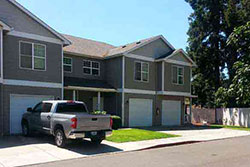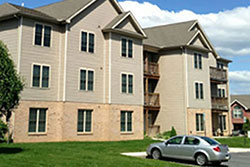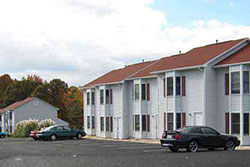How to Get the Best Rate on a Multifamily Loan
Are you looking to secure the best multifamily loan rate for a multifamily rental investment? Underwriters will take a look at factors such as subject property value, loan-to-value ratio, debt-service-coverage ratio, borrower’s net worth, liquidity, and credit rating.
For most, getting the best rate possible is the top priority. But there are other important loan terms that need to be considered as well. For example: You need to know if the rate is fixed or adjustable? Also, does the loan have a prepayment penalty? If you are considering selling the property, the prepayment penalty will be important. Are you looking for a recourse loan or a loan without a personal guarantee? What are the closing costs involved with this multifamily loan? While a lower rate might look attractive on the surface, it might not be worth it when you take all the costs into account. Some multifamily lenders change the terms during the underwriting process of your loan. Another thing to consider is if your lender has experience with apartment loans in your area? There are a lot of lenders that promise terms they can’t deliver. It's important to know upfront if you are talking to a qualified lender. These are just some of the issues, beyond interest rates, that you need to be aware of when refinancing your apartment loan.
Here are some of the factors that lenders will consider when they evaluate your apartment loan application:
- Property location – Lenders prefer properties in large cities or suburban areas as opposed to rural areas. Lenders consider multifamily loans in rural areas as riskier because they typically are harder to rent. If your apartment is in a very rural market, make sure to discuss that with the lender upfront.
- Lenders also want to see an apartment with high quality tenancy. Are the tenants signed to leases or are they month-to-month? Do you need to offer rental concessions in order to keep the units filled? Lenders do not like apartments that have to fight to maintain strong occupancy levels.
- What’s the cash flow and occupancy rate of the apartment building? Lenders like to finance apartments that have constant positive cash flow and a strong occupancy history. Lenders typically want to see an occupancy of at least 90% of the available units. Major fluctuations in cash flow cause a lot of concern for multifamily lenders.
- How is the condition of the subject property? Is it in good condition or does it need significant repairs and renovation? An apartment building in need of repairs could negatively impact cash flow and the ability to pay the mortgage.
- What are the loan to value and debt service coverage ratios? Most borrowers understand the LTV but are not always as aware of debt service coverage ratio. The debt service ratio looks at the mortgage payment in relation to the net operating income. Lenders utilize this ratio to ensure that enough cash flow exists at the subject property.
- What is your credit score? Conventional lenders typically expect to see credit scores above 680. Lower credit scores will require a solid explanation if you want to qualify for a conventional multifamily loan.
- What is your net worth and liquidity? Lenders want to make sure you have enough money to deal with potential setbacks!
- Lastly, do you have any experience managing or owning apartment buildings? Lenders will often require that a borrower has prior experience owning or managing real estate.
Another tip to get the best rate and terms is to consult a qualified commercial mortgage broker. A competent commercial mortgage broker who deals with many different types of lenders and understands the market from a national vantage point has an advantage over local banks. While local banks are limited to their own loan programs, mortgage brokers represent national institutions such as agency lenders, national commercial banks, credit unions, insurance companies, private lenders, hard money lenders and CMBS lenders. This wide choice of lenders will increase the likelihood of getting the best rates and terms for your apartment loan.
Multifamily investors in 2021 need to know what the best options for apartment loans are in the current market. The apartment building market is very hot right now in many parts of the country. Nationwide, the first half of 2021 saw more than 175,000 new apartments completed and a total of 363,000 for the previous 12 months. A high percentage of these new units were in Texas and other sunbelt states, as more and more people are relocating to warmer climates. Occupancy rates and asking rents have been lower in larger urban markets in the Northeast and other colder climates, while occupancy rates and asking rents have been increasing in these warmer sunbelt climates. These 2021 trends have definitely been driven by the COVID-19 pandemic and we are watching these trends closely to see if these trends persist after the pandemic is over. Check out our low commercial real estate loan rates and use our commercial mortgage calculator to calculate monthly principal and interest.
There are many different options for apartment loans in the current real estate market. Some of these options include agency lenders (Freddie Mac and Fannie Mae), local and regional banks, credit unions and CMBS lenders. Different lenders offer different types of terms on their loans. It’s important for an investor to understand his or her individual investment goal and the lender’s terms in order to make an informed decision regarding which type of financing to utilize. In this blog, we will look at some of the biggest types of apartment lenders and analyze their standard terms in order to help you make the best decision for your next apartment loan.
Here are some different types of Apartment Loans available in the commercial mortgage market:
Freddie Mac is one of the best nationwide sources of mortgage capital for apartment building financing. The Freddie Mac apartment loan programs offer many unique and beneficial features for apartment purchases and refinances, with a minimum loan size of $1,500,000. The loan application process is simple and streamlined. As an example, tax returns for the borrower and the property are not required. Loans typically close in 45 days and the program has much lower costs than other government or agency programs. Loans are non-recourse, which means that the borrower is not required to guarantee payments personally. Prepayment penalties are flexible, ranging from yield maintenance to soft stepdown. Perhaps the best feature is that Freddie Mac offers a free rate hold for 45 days from application. If rates change during the processing period, the loan rate is automatically held from the date of application.
Terms include:
- Loan Amount - $1,500,000 - $6,000,000, up to $7,500,000 in large markets
- Loan Purpose - Purchase or refinance, including cash out refinances
- Amortization - Up to 30 years
- Property Types - Apartment buildings of 5+ units, senior housing (with no resident services), apartment buildings with commercial space, properties with tenant-based housing vouchers, etc.
- Debt Service Coverage - 1.20x in top markets, 1.25x nationwide
- Maximum Loan to Value - 80% in top markets, 75% nationwide
- Loan Terms - 5, 7, and 10 year fixed rate options. After fixed rate period loan can either mature or convert to an adjustable rate (hybrid adjustable) at borrower option.
- Recourse - Non-Recourse, with standard carve-out provisions
- Credit Score - Minimum of 650
- Interest Only - Typically, 1-3 years of interest only are offered with slight adder to rate. Full term I/O might be available on lower leverage loans.
- Occupancy - Minimum occupancy of 90% for previous 90 days
- Taxes/Insurance - Escrows for taxes and insurance may be waived on lower leverage transactions
- Replacement Reserves - Not usually required
- Rate Lock - Rate held for 45 days from application without additional fee. No worries that rate will rise during the application period.
- Adjustments - Annual and lifetime caps on all adjustments (on hybrid/adjustable option)
- Assumable - Yes
- Prepayment Penalties - Yield maintenance, step-down and soft step-down options available
Fannie Mae is one of the nation’s leading secondary market sources of capital for apartment building financing. Fannie Mae provides mortgage capital for conventional, affordable housing, cooperatives, senior housing, student housing, manufactured housing communities and mobile home parks nationwide. Fannie Mae's apartment loan program offers many distinct advantages over traditional bank programs, including: long-term fixed rates up to 30 years, high LTV ratios up to 80%, and nonrecourse financing (no personal guarantee to the principals).
Terms include:
- Description - Simplified loan approval process for long term fixed rate financing for apartments, manufactured housing, mobile home parks, and cooperative apartments.
- Loan Amount - $1,500,000 – $25,000,000+ nationwide (larger balance loans available through the Fannie Mae DUS platform)
- Loan Terms - Fixed rates for 5, 7, 10, 12, 15, 20 and 30 years
- Amortization - Up to 30 years, based on the age and condition of the property
- Prepayment Penalty - Yield maintenance and step-down options available
- Recourse - Loans are non-recourse lending (with standard carve-outs for “bad-boy” acts)
- Debt Service Coverage - 1.25x minimum
- Loan to Value - Up to 80% maximum LTV for purchases and 75% for refinances
- Subordinate Financing - Supplemental mortgages are available after the first 12 months of the loan term or loan assumption
- Occupancy - Typically expect to see 90% occupancy for the previous 3 months
- Assumability - Non-recourse loans are assumable with the Lender’s consent
- Taxes and Insurance Escrows - May be waived on lower LTV loans
- Net Worth and Liquidity - Net worth and liquidity requirements must be met. Speak to us for details.
- Replacement Reserve Escrows - To be determined based upon appraisal and engineering reports
- Rate Lock - Rate lock occurs after commitment is issued; an early rate lock option is also available
- Timing - 45-60 days from complete application to closing
Another major source of mortgage capital for apartment building loans is the commercial mortgage-backed securities market through Wall Street investment banks. CMBS lenders make individual loans to borrowers which are then packaged and sold to investors as securities. These loans provide interest rate yield to their investors while contributing liquidity to the capital markets. This liquidity in the markets means lower commercial mortgage rates to borrowers. Borrowers are well served when there are multiple sources of capital in the market
Terms include:
- Loan Amount - $2 million to $10 million+
- Markets - Primary, Secondary, and Select Tertiary Markets
- Eligible Properties - Multifamily, Manufactured Housing, Office, Retail, Industrial and Self-Storage
- Security - First Lien Mortgage
- Term (years) - 10 years
- Amortization (years) - 25 – 30 years
- Max. LTV - 75%
- Min. DSCR - 1.25x
- Rate - Fixed rate based on spread premium over 10-year US swap rates
- Non- Recourse - Non-Recourse, except for standard industry carve outs
- Prepayment - Permitted after a typical lock out period, subject to defeasance
- Assumable - Permitted, subject to Lender’s Approval and 1% assumption fee
- Capped Costs - 3rd party costs & legal are capped
- Reserves - Real Estate Taxes, Insurance, Replacement Reserves, TI/LC (if applicable), and others as reasonably determined by underwriting
Bank and Credit Union Apartment Loans
Banks and credit unions are also great options for apartment loans. While the agency lenders typically have the lowest rates available in the market, many times the borrower would be better off obtaining an apartment building loan from a traditional portfolio lender. Often times, a portfolio product will better serve the needs of the borrower by offering more flexible underwriting and loan terms. Some of the key advantages to a portfolio or bank loan include:
- Flexible underwriting guidelines
- Flexible prepayment penalties
- Properties that are in need of repairs, maintenance, or updating
- Properties in less than desirable markets
- Properties in smaller markets
- Borrowers with difficulty providing tax returns
- Borrowers with past credit issues
- Properties with less than stellar cash flow
- Borrowers who are not citizens or Green card holders
- Mixed-use properties containing commercial income
- Properties that house college students in college towns
- Loans that require cross collateralization with other properties
- HUD contracts, HAP contracts and Section 8 tenants acceptable
- Mobile home parks and manufactured housing communities
- Purchases where the down payment results from a gift from family members
- Loans with long-term amortization and no balloon payments
Very often, a property does not qualify for traditional lender programs for various reasons including: vacant properties, properties with un-stabilized occupancy, properties in need of major repair or remodeling, properties that do not cash flow or are underperforming, or loans that must close with a very quick timeline. These loans are very often best served by a bridge loan. Bridge loans are short-term loans, usually at higher rates than traditional financing that allow the borrower the time and money to reposition a property in order to qualify for traditional bank or agency apartment loans in the future. Our apartment bridge loan program is available in major markets nationwide with a minimum loan size of $1,500,000. We offer these loans for both commercial and multifamily properties. Our loans may be available with non-recourse to the borrower and we may offer interest only payments. Our loan program can be used to help a borrower to position a property for permanent long-term financing in the future.




